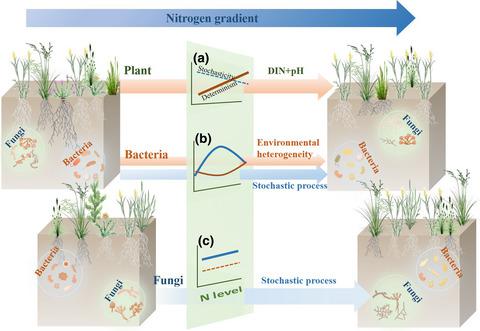当前位置:
X-MOL 学术
›
Glob. Change Biol.
›
论文详情
Our official English website, www.x-mol.net, welcomes your
feedback! (Note: you will need to create a separate account there.)
Long-term nitrogen input alters plant and soil bacterial, but not fungal beta diversity in a semiarid grassland
Global Change Biology ( IF 10.8 ) Pub Date : 2021-05-16 , DOI: 10.1111/gcb.15681 Weixing Liu 1, 2 , Lingli Liu 1, 3 , Xian Yang 2 , Meifeng Deng 1 , Zhou Wang 3, 4 , Pandeng Wang 5 , Sen Yang 1, 3 , Ping Li 1 , Ziyang Peng 1, 3 , Lu Yang 1, 3 , Lin Jiang 2
Global Change Biology ( IF 10.8 ) Pub Date : 2021-05-16 , DOI: 10.1111/gcb.15681 Weixing Liu 1, 2 , Lingli Liu 1, 3 , Xian Yang 2 , Meifeng Deng 1 , Zhou Wang 3, 4 , Pandeng Wang 5 , Sen Yang 1, 3 , Ping Li 1 , Ziyang Peng 1, 3 , Lu Yang 1, 3 , Lin Jiang 2
Affiliation

|
Anthropogenic nitrogen (N) input is known to alter plant and microbial α-diversity, but how N enrichment influences β-diversity of plant and microbial communities remains poorly understood. Using a long-term multilevel N addition experiment in a temperate steppe, we show that plant, soil bacterial and fungal communities exhibited different responses in their β-diversity to N input. Plant β-diversity decreased linearly as N addition increased, as a result of increased directional environmental filtering, where soil environmental properties largely explained variation in plant β-diversity. Soil bacterial β-diversity first increased then decreased with increasing N input, which was best explained by corresponding changes in soil environmental heterogeneity. Soil fungal β-diversity, however, remained largely unchanged across the N gradient, with plant β-diversity, soil environmental properties, and heterogeneity together explaining an insignificant fraction of variation in fungal β-diversity, reflecting the importance of stochastic community assembly. Our study demonstrates the divergent effect of N enrichment on the assembly of plant, soil bacterial and fungal communities, emphasizing the need to examine closely associated fundamental components (i.e., plants and microorganisms) of ecosystems to gain a more complete understanding of ecological consequences of anthropogenic N enrichment.
中文翻译:

长期氮输入改变植物和土壤细菌,但不会改变半干旱草原中的真菌β多样性
已知人为氮 (N) 输入会改变植物和微生物的 α 多样性,但氮富集如何影响植物和微生物群落的 β 多样性仍知之甚少。在温带草原中使用长期多级 N 添加实验,我们表明植物、土壤细菌和真菌群落对 N 输入的 β 多样性表现出不同的响应。由于定向环境过滤的增加,植物β-多样性随着氮添加量的增加而线性下降,其中土壤环境特性在很大程度上解释了植物β-多样性的变化。土壤细菌β多样性随着氮输入的增加先增加后减少,这最好用土壤环境异质性的相应变化来解释。然而,土壤真菌 β 多样性在整个 N 梯度上基本保持不变,植物 β 多样性、土壤环境特性和异质性共同解释了真菌 β 多样性变化的微小部分,反映了随机群落组装的重要性。我们的研究证明了 N 富集对植物、土壤细菌和真菌群落的组装的不同影响,强调需要检查生态系统中密切相关的基本组成部分(即植物和微生物),以更全面地了解人为造成的生态后果。 N 富集。
更新日期:2021-07-13
中文翻译:

长期氮输入改变植物和土壤细菌,但不会改变半干旱草原中的真菌β多样性
已知人为氮 (N) 输入会改变植物和微生物的 α 多样性,但氮富集如何影响植物和微生物群落的 β 多样性仍知之甚少。在温带草原中使用长期多级 N 添加实验,我们表明植物、土壤细菌和真菌群落对 N 输入的 β 多样性表现出不同的响应。由于定向环境过滤的增加,植物β-多样性随着氮添加量的增加而线性下降,其中土壤环境特性在很大程度上解释了植物β-多样性的变化。土壤细菌β多样性随着氮输入的增加先增加后减少,这最好用土壤环境异质性的相应变化来解释。然而,土壤真菌 β 多样性在整个 N 梯度上基本保持不变,植物 β 多样性、土壤环境特性和异质性共同解释了真菌 β 多样性变化的微小部分,反映了随机群落组装的重要性。我们的研究证明了 N 富集对植物、土壤细菌和真菌群落的组装的不同影响,强调需要检查生态系统中密切相关的基本组成部分(即植物和微生物),以更全面地了解人为造成的生态后果。 N 富集。













































 京公网安备 11010802027423号
京公网安备 11010802027423号